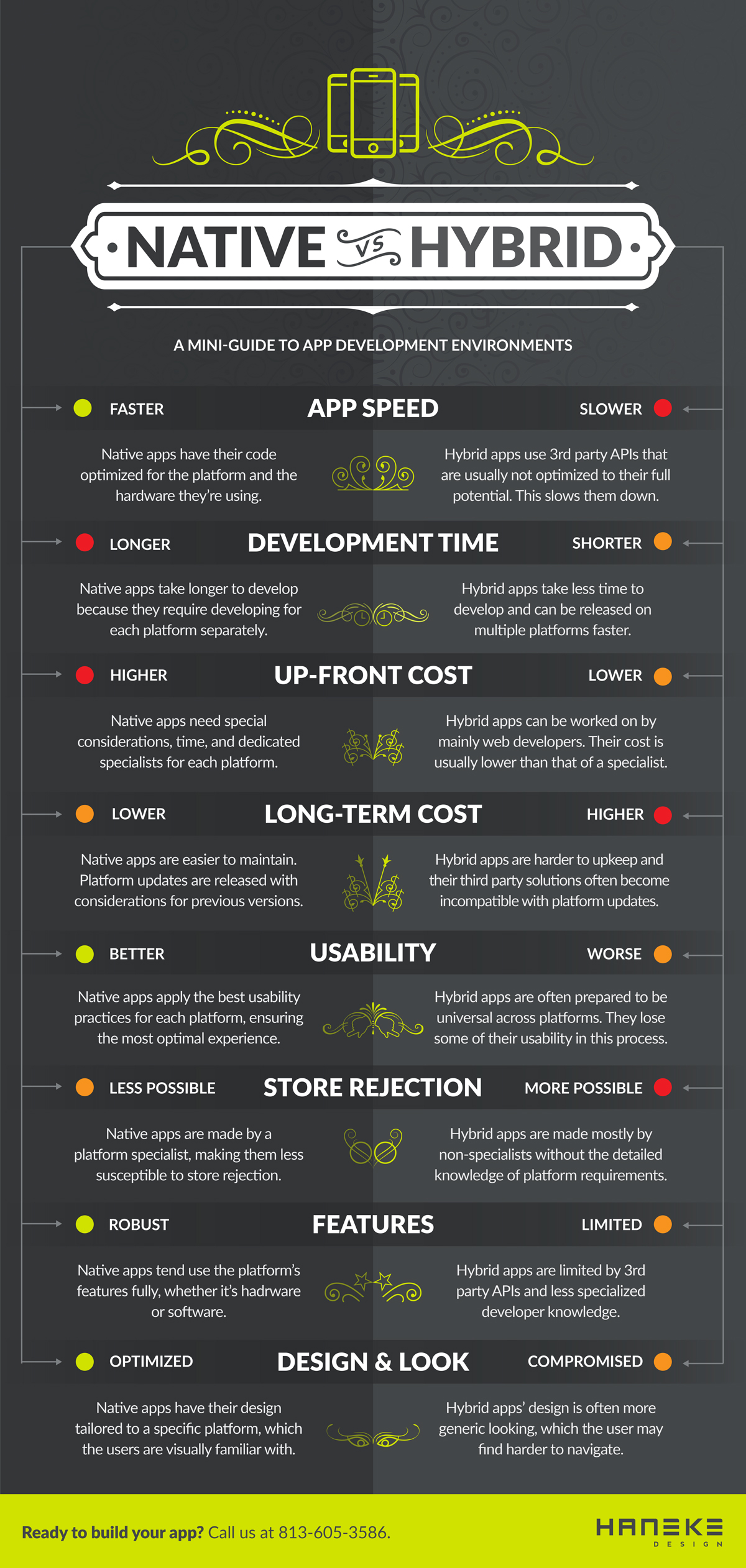
Buzz / 03 13, 2017
HYBRID VS. NATIVE MOBILE APPS: WHICH IS RIGHT FOR YOU? (INFOGRAPHIC)
Creating an app is a complex endeavor. In this series, we are breaking down the pros and cons between native and hybrid mobile apps to help determine which method is the right fit for your mobile app idea.
Many decisions must be made regarding user experience, appearance, branding, and development approach. There are those who advocate a hybrid approach to code; however, we have developed a preference for pure native apps. This article explains why.
What is the difference between Native and Hybrid Apps?
A hybrid app attempts to achieve cross-platform support by combining some native components with some shared components, often HTML and Javascript. While a pure native app is an application program that has been created for use on a specific platform or device. Because native apps are written for a specific platform, they can interact with and take advantage of operating system features and other software that is typically installed on that platform.
Web-Based Hybrid Frameworks
For the first part of this series, we are focusing on the pros and cons of hybrid frameworks.
It is important to consider this decision carefully because the actual writing of the app code is often the most expensive part of the process.
Proponents of hybrid frameworks primarily argue that using their tool will reduce development cost through the use of less specialized developers, and “write once run anywhere” web-based approaches:
“The developers gain, as they have to spend less effort to develop an app that will work across all mobile platforms. The businesses gain, as the app is prepared and ready to hit the market in minimalistic time.”
The idea is to leverage web developers that you may already have in your company to produce the app without having to hire specialists or retrain anybody. The hope is that an app written using standard web-based tools will work across all phone platforms.
The positive aspect of using a hybrid approach is that a company may be able to leverage its current web developers without suffering the expense of finding/training native developers. If a company already has a solid web development team with experienced people, they may be able to produce a hybrid app in less time despite having to learn how to use the hybridization tool.
Cost to develop may be reduced through a hybrid approach; however, companies need to consider the value proposition and return on investment in the product. When a company considers its customer base and reputation, it will quickly see why it’s important to write a native app.
The end users of an app don’t care what technology was used to write it. Their principal concerns are ease of use and performance. For example, a user is likely to give up on an app if it takes too long to load after starting, or if the app hesitates when a button is tapped.
“Performance is a crucial contributor to dependable mobile app user experience, so it should be considered a key driver in the design process.”
Users expect the app to conform to the standard look and feel of the phone’s platform and are less likely to accept a “generic app” that was written without regard to the platform it’s being run on.
“Consumers expect an app to identify what device they are on and present them with the right set of options and functionality for that particular device.”
When users give up on the app because of these types of issues, it won’t matter how much money was saved in development because the app will end up being a negative mark on the company image and therefore have a negative ROI.
Comparing Hybrid vs. Native Apps

In Review
In short, native apps create a better user perception, and user acceptance is the most important factor in an app’s success. Your company’s app represents the brand to its customers, and casting the brand in the best light possible is vital for not only the app’s success but also the success of the company.
There is no one-size-fits all definition for how you should build your mobile app. At Haneke Design we prefer to use native apps, because they provide the best overall user experience. When developing an app, the goal is to engage your end user. For that reason, native apps beat out hybrid web apps in both UI and UX. Even if you are on a budget, native apps are less costly in the long-term, allowing you to expand your app’s functionality as your business grows!
Our next part of this series will discuss the other frameworks for hybrid apps and how they compare to a native app alternative. Until then, do you agree or disagree? Know of a web-based hybrid framework that you think rivals a native app? Tell us what you think.
Sources
Written by Daniel Tartaglia, iOS Mentor, and Thomas Komarnicki, Android Mentor. Both are in-house developers at Haneke Design in Tampa, FL with a combined 23 years of development experience.



